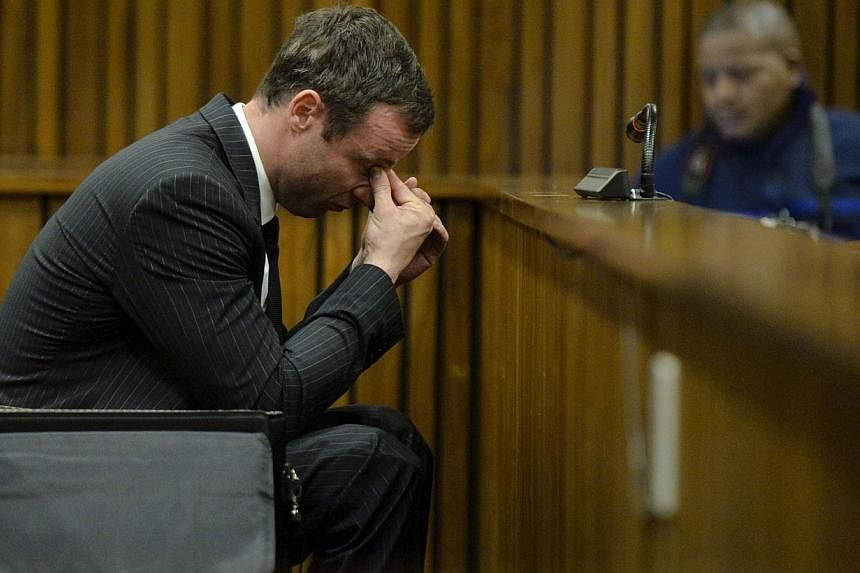PRETORIA (AFP) - A verdict in the high profile murder trial of sports star Oscar Pistorius has been set for Sept 11, after lawyers wrapped up five months of drama-filled proceedings on Friday.
Eighteen months after Pistorius shot dead his girlfriend Reeva Steenkamp on Valentine's Day 2013, the star's fate now lies in the hands of South African Judge Thokozile Masipa.
"We shall be back here on the 11th of September at 9.30 for the judgment," said Masipa, drawing proceedings to a close.
Pistorius stands accused of deliberately shooting dead his glamorous 29-year-old lover with hollow point "cop killer" bullets after an argument. He faces 25 years in jail if convicted, but has pleaded not guilty, saying he mistook Steenkamp - who was in a locked toilet cubicle when she died - for an intruder.
During a trial that has heard testimony from nearly 40 witnesses, the athlete - celebrated for his courageous journey from disabled child to Olympic champion - often cut a wretched figure. Amid gruesome evidence about Steenkamp's gunshot wounds to the head, hip and hand, Pistorius vomited in the dock and later frequently broke down in tears.
Proceedings concluded on Friday with fiery defence lawyer Barry Roux insisting the "cold facts" did not prove his client's guilt and that the state's case was "circumstantial". In a last-ditch plea to the court, Roux sought to show there was enough doubt about the prosecution to make a murder conviction impossible. He said the evidence suggested the Paralympian should never have faced a murder trial, but rather the lesser charge of culpable homicide.
"The failure of the state to present that evidence leaves one big question mark," said Roux. "That's the failure of the state's case."
'Highly vulnerable'
The defence has sought to explain Pistorius' actions as those of a "highly-vulnerable individual" obsessed with safety - a result of a difficult childhood and his disability - in a country with a sky-high crime rate.
The trial was even delayed for one month as Pistorius underwent psychiatric evaluation. An ensuing report said he was suffering post-traumatic stress disorder, but was not suffering any mental illness that could prevent him being held criminally responsible for his actions.
Roux argued on Friday that the "slow burn" caused by Pistorius' anxiety is comparable to that of an abused woman who finally attacks her husband, causing the judge to interject. "How does it apply to the accused in this case?" Masipa asked.
Roux tried to explain: "That constant reminder, I do not have legs, I cannot run away, I am not the same, that's with him, he can't pretend, he can't pretend that it's fine."
"That effect of that over time - it filled the cup to the brim."
Roux admitted that Pistorius should be found guilty of discharging a firearm in a Johannesburg restaurant, one of three gun-related charges the athlete also faces. Pistorius had pleaded not guilty to those charges.
"He's guilty, my lady - guilty on the first alternative, that he negligently used that firearm," said Roux.
'Deceitful witness'
On Thursday, Pistorius, a double amputee known as the "Blade Runner" for his prosthetic legs, was branded a "deceitful" witness by prosecutor Gerrie Nel in his final arguments.
Pistorius's efforts to concoct an alibi had led to a "snowball effect" of lies requiring more lies to back them up, Nel said. "In an attempt to tailor his version to support his plea explanation, he tangled himself in a web."
Summing up the state's review of evidence, Nel said Pistorius was guilty of "a baker's dozen" of misleading statements.
Roux rejected that assertion. "There's no mosaic crumbling and falling, there's no dropping of the baton, so eloquently put by Mr Nel," said Roux. "Everything slots in."
Legal analysts say the athlete undermined his case by appearing to offer two different defences - one that he mistook Steenkamp for an intruder, and one that he fired accidentally.
Steenkamp's parents Barry and June sat side by side in the first row of the public gallery, their faces impassively fixed on Roux as he described Pistorius shooting their daughter.
Pistorius rose to international fame when he competed alongside able-bodied runners at the 2012 London Olympics. Once a poster boy for disabled sport, Pistorius has been stripped of lucrative endorsement deals by global brands and has withdrawn from all competition.
Even if Pistorius is not found guilty of premeditated murder, he could still be convicted and jailed on alternative charges of culpable homicide, or manslaughter.
"Culpable homicide could get him anything from a warning to 15 years, again depending on the seriousness of the case and personal circumstance of the accused," said Stephen Tuson, a lawyer and lecturer at the University of the Witwatersrand.

